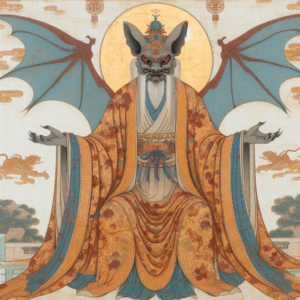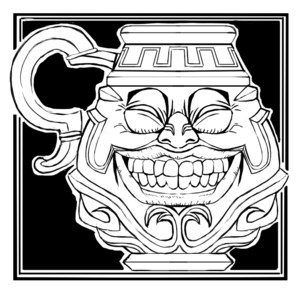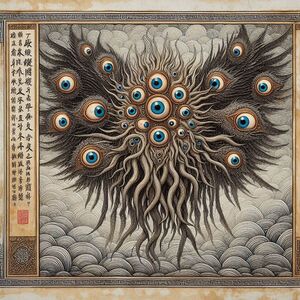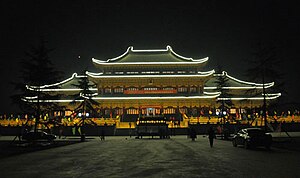Chongbai
Chongbai (崇拜) also called Worship of the Deep is the ethnic religion of Daxia and is practiced by a majority of the Daxian people. A polytheistic religion, the Chongbai pantheon is composed of dozens of gods and hundreds of minor deities and aspects of nature. Aspects of Chongbai have influenced the cosmovision of Daxians and their sense of special destiny; Daxian racialist theories are deeply enmeshed with Chongbai religious doctrines. The Emperors were considered to be the heads of the Chongbai religious hierarchy thanks to their special connections to the divine, in their absence the Custodian of the Grand Temple of Diqiu and Grand Hierophant is considered the seniormost and preeminent religious figure. Out of favor after the end of dynastic rule, Chongbai has begun to see a revival in its popularity during the last two decades as resistance and agitation against 'foreign' religions is on the rise. The number of Chongbai adherents hovers around 350 million people as of 2035.
Mythos
In the Chongbai mythos of creation, the creator of the earth is Diqiu who is God of the Underworld. Diqiu built a barren world at first and shaped the first three gods in his Furnace of Creation, these gods who he considered his children were then to fill the world with their own creations; they would be given a domain in accordance with their nature. The first of Diqiu's children to emerge from the Underworld was Tian who looked above him and saw nothingness, which displeased him. Tian began exhaling air for many days until he had created the sky and the clouds; for this he was made God of the Sky. The second god to emerge was Sangu, he walked the earth and grew tired of the harshness of its surface on his feet. He took out a satchel filled with water from the underground and spilled it about him, thus he created the first oceans; for this he was made God of the Seas. The third god to emerge was Ziran who looked all around and saw nothing but bleak rock and tepid water. She cut locks from her hair, planted them in the hard ground and fed them water from the sea and blood from her hand, from this grew the first trees. Ziran the Goddess of Nature also known as the Gardener traveled all over, creating more greenery until the world was a paradise; she gave it the name of the Great Garden. Upon seeing the works of his children, Diqiu was pleased and as a reward he created all the creatures that fly in the air, that swim in the seas and that crawl on the ground to populate the world and domains of his children.
Shortly after this, Diqiu began to meditate in a cave and over a number of years he expelled the bad humors from his divine flesh. These spiritual excretions fled from his presence and hid in the dark corners of the world, resting and growing. Eventually they would resurface and as befits their godly origin, the took on the appellation of the Ruinous Powers. Each according to the trait that gave them shape, they took on terrible shapes and set to impose their will upon the lands by unleashing evil creatures upon it. The goddess Ziran appealed to her divine father for help to protect her Garden, he responded by fashioning two brass golems; one male and one female. These Men of Brass would go on to defend the Garden and would eventually sire humanity, but this the gods did not know yet. Seeing their creatures could not withstand the Men of Brass, the Ruinous Powers gathered in secret and created the Curse of Flesh which they used on their metallic foes. The curse turned the Men of Brass into creatures of flesh, the first humans. These first humans were still bound by their divine mission to protect the Great Garden but without their strong skins they were no match for the creatures of shadow. To help them, Diqiu commanded the God of Fortune Mingje to flip his coin favorably for humans three times. Each coin flip gave humanity a boon they would use to defend themselves. The first coin flip granted to humans the first fire, which they used to ward of the dark and the creatures that dwelled within. The second coin flip granted them the boon of inventiveness, with which they could construct secure holdings and weapons to marshal their forces. The third coin flip granted them the ability to reproduce with one another, this led to the rapid multiplication of humanity. With these boons humanity soon raised an army like the world had never seen before and waged a terrible war against the servants of the Ruinous Powers, putting them to flight in disarray into the recessed corners of creation.
Deities
Beneficent Deities
Diqiu
God of the Underworld, creator of mankind and chief deity of the pantheon. Commonly represented as a bearded old man sitting in a cave.
Ziran
Ziran is the Goddess of Nature, creator of the Great Garden and guardian of the natural world. In ancient times she was worshipped primarily by the Men of the hedge. She is often depicted as a serpent with feathers.
Tian
God of the Sky, associated with dreams and prophecy. Depicted as a large cloud with lightning bolts coming out of it.
Sangu

Sangu is the God of the Sea and Master of the Tides, his favored physical form is that of a large crab with a dark blue carapace. In Chongbai mythology Sangu was one of the crafted deities, meaning he did not spontaneously emerge as some shedded aspect of the chief deity Diqiu. Instead Sangu was built by Diqiu in the Furnace of Creation out of rocks and minerals. Diqiu gave him an unbreakable hide and powerful, rending claws as befit a combative being. Upon being finished, his creator gave him a satchel that would spew forth any element Sangu desired, a tool to help him shape the world. As Sangu walked the earth, he grew tired of the harshness of its surface on his clawed feet. He took out the magic satchel and willed it to be filled with water from the underground and spilled it about him, thus he created the first oceans.
Mingje

Mingje is the God of Fortune, his domain is luck and games of chance; he also has ties to Daxian Numerology. Mingje was created by Diqiu from a puddle of magic clay, his original task was to arbitrate a dispute between Ziran and Sangu as to who had domain over swamps. With both laying claim and refusing to budge, Mingje determined that the most fair way to decide was by the simple flipping of a coin, which he produced. The two gods each chose a side of the coin and Mingje flipped it, Ziran was the winner and added swamps to her care. From the on Mingje and his coins became an arbitrator of the gods, if they chose to chance the outcome of disputes with his coin flips.
It is noted in religious texts that Mingje has no permanent abode, he wanders the cosmos tempting anyone to play games of chance with him. He is often depicted playing with various supernatural beings such as ogres, sea dragons and other prideful creatures. Mingje is said to have acquired his signature gold coin by stealing it from Jinyuan's pot, an act that has turned the God of Greed into his eternal enemy.
It is said that when a human is born, Mingje flips a coin to determine if that person's life will be lucky or unlucky. The God of Fortune cares not about the outcome, he will enforce whatever the coin dictates. Very rarely he may use his will to move the coin to grant favorable luck, this may happen if he's had a good streak himself. Temples to Mingje are few and far between, they usually feature a fountain where devotees can toss a coin to gain the favor of Mingje. Small shrines are more common, they are usually sparse and consist of a single room with a statue of the god and a bowl to leave an offering. Mingje is considered the patron god of gamblers, he is popular in Zhijun for this reason. Businessmen, sportsmen and those engaged in numerology are also common devotees of him, praying for luck in their respective endeavors.
Gunru

Gunru is the God of Agriculture and ensuring the harvest is bountiful is his province. In Chongbai's mythos he is a servant of the goddess Ziran and is opposed to Abotur because the disasters he causes ruin crops and disrupts the lives of farmers. Chongbai doctrine teaches that Gunru was once a normal bat bereft of divinity, eking out his life in a dimly lit cavern system. In her efforts to teach mankind how to fend for themselves, the goddess Ziran sought to purify the land and make it suitable for agriculture. Much of the land had been badly poisoned by Yeenog and the foulness resisted Ziran's divine ministrations. Frustrated, the goddess wandered into a cave and happened upon the leavings of Gunru and instinctively used them in the soil to absorb and remove the corruption. As thanks for his humble contribution, Ziran bestowed a part of her divine power on the humble bat by feeding him an apple overflowing with her divinity. Having being made into a god, Gunru was then charged him to look forevermore over the fields of men and ensure the land provided for them.
Despite his fearsome appearance, Gunru is a very popular and beloved deity, having one of the largest number of festivities in his honor year round; his temples regularly organize donations of food for the needy and many operate soup kitchens. More than many other deities, temples to Gunru are purposefully constructed in underground spaces for even though his domain are the verdant fields, he cannot help but have a love for the dark spaces given his origins. The Ministry of Agriculture employs a bat mascot in reference to Gunru, an action that has received mixed reactions with the public.
Ruinous Powers
The Ruinous Powers were originally the dark traits of Diqiu's divine being, they took independent shape when they were expelled from his body. They are said to be akin to base desires given thought and they seek only their own exaltation. Rather than be truly worshipped by men, these gods are sought to be appeased by the faithful with offerings and flattery.
Yeenog
Yeenog is the God of Shadows, Decay and Strife, he is also called the Dark King. Yeenog is the chief deity of the Ruinous Powers and the first to emerge from Diqiu. He often takes different shapes, the most common are that of a pillar of black smoke with ten arms and that of a humanoid pig with horns and golden skin. Yeenog takes pleasure in the conflict between men and the entropy and decay that sets in after bloody war. He is also the patron god of shadows and the dark, foul deeds done under cover of darkness are looked upon by him with approval. Yeenog is the only known deity for which there have existed human sacrifices in the past, usually in the form of vials of blood; this practice was prohibited during the Shang dynasty.
Yeenog has few known temples, there are only five known places of worship dedicated to him in mainland Daxia although his shrines are widespread in the seedy underbellies of the largest cities. The criminal element prays to the God of Shadows for the success of their deeds and the average Daxian might pray to him in secret to destroy their enemies.
Jinya

Jinya is the God of Greed and is the deity responsible for creating the obsession of Daxians with money and profit. He is represented by a clay pot with a sinister grinning face. He is one of the primordial dark traits that Diqiu cast out from his own flesh and later coalesced into its own being. The God of Greed, unlike its foe Mingje the God of Fortune, does not believe wealth is derived from luck. Jinya teaches that wealth comes from acts of ruthlessness and slyness. Actions such as the stealing of an inheritance, defrauding a business partner and creative accounting to skimp on taxes are all acts that are pleasing to the God of Greed. And once in hand, one must not let go, money must be made to multiply but it is not for sharing, but for admiring and hoarding. Jinya takes the form of a pot presumably filled with gold, he tempts mortals into reaching inside to help themselves to some and in doing so he curses them with eternal greed, a pot in their hearts that can never be filled.
Temples of Jinya are gaudy places that radiate an appearance of opulence, they are filled with tapestries and pyrite statues; the real gold statues are too valuable for open display. The holiest place of these temples is in fact a hidden vault were the temple's valuables are sequestered away, usually completely inaccessible to anyone but the priests. Priests of Jinya are usually men learned in the ways of coin, in addition to religious guidance they can give monetary advice, but always for a price.
Abotur
Abotur is the God of Tremors and Disasters, he responsible for earthquakes, volcano eruptions and other cataclysms. He is commonly represented by a mountain with one eye. Ancient texts are unclear of the true disposition of Abotur, some theorize he is not truly malign but is instead trapped inside the mountain that appears as his 'body' and the tremors he produces is him merely attempting to break free. Abotur might be one of the least popular gods, possibly due to his inhuman appearance. He is most worshipped in regions subject to earthquakes, rescuers, mountaineers and cave divers are his most numerous faithful.
God of Death

XXXX is the God of Death
Practices
The most basic ritual of Chongbai is the ritual offering to a god or gods. These offerings can be of a varied nature, the importance is the value the giver assigns to the offering. Most people offer money be it coins or banknotes, small jewelry and incense. Also popular are talismans where the holder promises to do a service for the god in the afterlife in exchange for a favor in the present. The ritual offering is a personal ritual, it is not necessary for a priest to be present and no specific words must be recited.
There are numerous festivals in Chongbai, these are the more organized and ritualized form of worship the religion has. They involve processions, strict ritual by the priesthood who lead the faithful in singing religious hymns and banquets. The most important of these festivals is the Festival of the Awakened which takes place June 1st through 8th. This period marks the 'awakening' of the Men of Brass to their humanity
Beliefs
Chongbai holds that the Underworld is the abode of the gods and the ultimate resting place of the spirits of the dead. Unlike in other religions, in Chongbai heaven is only another layer of the mortal world and holds no special significance. All blessing and spiritual guidance come from communing with the Deep. The Deep is the domain of Diqiu, God of the Underworld, his realm is divided into eight divine layers, which constitute the afterlife. All souls who have lived lives deemed worthy by the Beneficent deities are assigned to one of the eight layers, the souls of the unworthy are cast into the Furnace of Creation and destroyed permanently.
Chongbai do not carry out traditional burials of the dead, Chongbai doctrine dictates that to truly pass on to the afterlife the body must be fully destroyed by being incinerated and the ashes scattered in the wild. Keeping the ashes of the deceased is seen as unorthodox and sinful, an attempt at tying down the spirit to a physical object. For this reason there are no Chongbai cemeteries, people might use the same place to spread ashes for generations and these spots might gain the appellative of 'respected ashery'.
Temples

Large temples dedicated to a particular god usually exist in larger cities. As there is no centralized authority, these temples are maintained by the local faithful with their own resources or from special funds donated by the city administration. The priest or priests who give services and live there also subsist from the donations from the same sources. Some cities choose to adopt a single patron deity.
Shrines
Shrines are small places of worship, they tend to be ad-hoc spaces or simple constructions. A simple plinth with a small statue in the corner of a courtyard, a sturdy table with candles and offerings; these spaces are meant to be used for simple daily devotions. They proliferate in packed urban settings where access to a temple is hard or not practical. Fanes are a type of shrine that are usually maintained in the wild by passerby or hermits, for devotions in far off natural places.
Religious Hierarchy
Holy texts
Artifacts